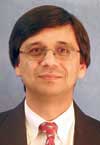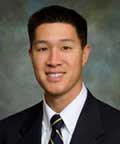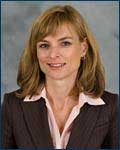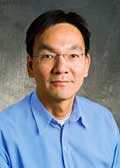 Vincent M. Powers J.D. ’97 works as a biotech attorney for a leading company that designs fast medical tests.
Vincent M. Powers J.D. ’97 works as a biotech attorney for a leading company that designs fast medical tests.
Anyone who has had to wait days for the results of a medical test has done a lot of nail-biting. But the need for fast medical test results is not just a convenience in our get-it-now society. It can be a health necessity.
“Fast testing is vital,” says Powers, “particularly for contagious disease. Having test results in less than an hour or two can help doctors choose the right treatment right away and also decide when patient isolation is necessary. It can also help avoid wrong treatments and reduce hospital stays.”
Powers, whose sister’s close friend could only watch as her son endured a month of hospitalization after contracting a MRSA infection from heart surgery, is glad to be part of a leading company that designs fast medical tests, such as a 60-minute test for MRSA and a 100-minute test for tuberculosis.
Powers has masterfully combined his education in science with a Santa Clara Law degree to become one of just a handful of biotech lawyers working in this highly specialized field. “I am using all of my education since kindergarten,” he says.
In high school Powers was interested in math, chemistry, and English. He learned to sail in the Sea Explorers, an organization devoted to keeping nautical traditions alive through sailing, rowing, knot tying, and Morse code competitions. He also studied as a classical pianist. At Caltech (’83) Powers majored in chemistry. He then earned a PhD in pharmaceutical chemistry at UCSF (’89) and spent an additional two years at UC Berkeley as a NIH post-doctoral fellow.
Yet as he was completing his studies with an eye toward teaching at a research university, the job market softened. “I had a friend who left graduate school at Harvard to join the patent litigation group at Fish & Richardson in Boston. I felt it was within my ability to write and argue about science, so I left the lab bench, doing experiments that didn’t always work, to become a patent agent, introducing me to patent law.” His employer, Peter Dehlinger, graciously paid for Powers to attend the evening program at SCU Law while working full-time as a patent agent. Powers was admitted to the California Bar in 1997.
In 1999 he joined Applied Biosystems (ABI) in Foster City as a Patent Attorney and then Director of Chemical Patent Practice. While at ABI, Powers handled patent applications and contracts and, with the help of several exceptional litigation firms, he managed the enforcement and defense of several commercially valuable patents in the U.S. and abroad, leading to several injunctions and favorable settlements.
Powers left ABI in 2007 to join Cepheid, a Sunnyvale California company, where he is Vice President of Intellectual Property. Cepheid develops genetic tests for clinical diagnostics, industrial, and biothreat markets, with 2008 revenues of over $160 million. One of the systems that Cepheid has patented is a machine for processing test cartridges for pathogens such as MRSA (methicillin-resistant Staphylococcus aureus), a nasty bacterium that hospitalizes over 200,000 patients and results in approximately 20,000 deaths in the U.S. annually. An MRSA test cartridge typically costs around $40-$45, and the test machinery costs tens of thousands of dollars, depending its on cartridge capacity. When compared to a mean cost of around $21,000 to treat a single infected patient, such testing can be quite cost-effective.
The cartridge embodies remarkable technology. About the size of an ordinary salt shaker, it is designed to automate many time-consuming manual steps. After a sample is collected from just inside a patient’s nose, the sample is suspended in a solution and then pipetted into small opening at the top of the cartridge. The cartridge is then placed in a machine smaller about the size of a lunch box. The cells are then blasted open, the released target DNA is mixed with reagents, and the target DNA is multiplied a billion-fold until a fluorescent signal appears in a tiny transparent chamber. (Powers can explain the details of the biology, chemistry, and engineering in detail, thankfully drawing analogies to baking chocolate chip cookies!) All of these steps are completed in about 30 to 100 minutes, depending on the target that the cartridge detects, and each cartridge can be run in an individual module of the machine as soon as the sample is collected. Powers summarizes this technology as “Extraordinary.”
Most exciting to Powers is the privilege of working with scientists and business people who bring innovation to life. Powers uses his legal training daily, in patent analysis, contract drafting and legal counseling. “We live in an age of unparalleled discovery,” he says, “that will continue to require professionals who bridge science with the law, and for whom SCU should continue to play a vital educational role.”
 Narinder Banait J.D. ’97, International High Tech Law Certificate
Narinder Banait J.D. ’97, International High Tech Law Certificate
Narinder Banait brought to his law school class five years of experience working full-time as a research scientist in the pharmaceutical industry (at Syntex and Roche in Palo Alto), as well as a B.S. in chemistry and biochemistry, an M.S. in synthetic chemistry, and a Ph.D. in organic chemistry. Before law school his research focused on 5-HT3 antagonists for the treatment of emesis and anxiety disorders. Dr. Banait says he chose SCU Law because it had “not only the best part-time program in the area, but also one of the top IP programs in the country.” Moreover, the attorney who drafted patent applications on Dr. Banait’s own inventions—an alumnus of SCU Law—recommended it. A partner at Fenwick & West, Dr. Banait represents clients in many life sciences areas including pharmaceuticals, biotechnology, nanotechnology, and genomics.
He credits Santa Clara Law with helping establish his legal practice. “To build a successful law practice really requires you to create and successfully maintain relationships. The faculty and my classmates at SCU law valued the relationship aspect of attending law school, and the skills transferred to building my practice.”
 Jennifer Bush J.D. ’03, cum laude and Order of the Coif, High Tech Law Certificate
Jennifer Bush J.D. ’03, cum laude and Order of the Coif, High Tech Law Certificate
Editor-in-Chief of the Santa Clara Law Review (Vol. 43), recipient of the Mabie Award for Outstanding Graduate 2003, and Graduating Student of the Year 2003, Jennifer Bush now practices with Fenwick & West, mainly prosecuting patents in the software, electronic engineering, and life sciences disciplines, and advising and counseling clients on intellectual property issues and strategy.
Bush holds a B.A. in biological sciences and English from UC Santa Barbara. She is a member of the State Bar of California and registered with the United States Patent and Trademark Office.
Bush says she is glad she chose SCU Law because “the breadth and depth of its IP course offerings allowed me to have greater exposure to different and deeper areas of IP than some of my peers who went to schools with fewer IP offerings” and “the number of classes taught by actual practicing attorneys brought a greater exposure to ‘real life’ IP practice.”
 Paul Grossman J.D. ’97
Paul Grossman J.D. ’97
Paul Grossman is the is the senior vice president of strategy and corporate development for Life Technologies, a biotechnology tools company that does everything from DNA analyses to monitoring and tracking the H1N1 virus. Read his full profile here.
 Lawrence Kong J.D. ’07, High Tech Law Certificate
Lawrence Kong J.D. ’07, High Tech Law Certificate
Any number of lawyers could draft your patent application for an improved salad spinner, but if your patent involves a microscopic particle, you might want to retain Lawrence Kong. Dr. Kong did his doctoral research at UCLA in computational image reconstruction, virology, and molecular and cellular biology, leading to the first 3-D image of the vault ribonucleoprotein (called “vault” because it’s shaped like a cathedral) and high-resolution images of HIV virions.
Dr. Kong, an associate at Wilson Sonsini Goodrich & Rosati, counsels on patents and patent due diligence and prosecutes patents in the areas of pharmaceuticals and biotechnology.
Besides his Ph.D. in medical and molecular pharmacology, Dr. Kong holds a B.S. in biology from UCLA. He was attracted to SCU Law because of the “great reputation of its IP program,” its “personal nature,” and its night program, which allowed him to work full-time at a biotech company.
SCU exceeded Dr. Kong’s expectations in terms of its faculty. “The SCU faculty provide the theoretical training to prepare you for critical legal thinking, but also, because many of them worked in private practice, they understood and taught from a practical perspective. We were taught not only the textbook theory, but also what practitioners might see in their actual careers.”
 Michele Moreland, BA ’89, JD ’98, High Tech Law Certificate
Michele Moreland, BA ’89, JD ’98, High Tech Law Certificate
The class that best prepared Michele Moreland for her work as a patent litigator was … Chaucer. Okay it wasn’t law school, but it was Santa Clara. Moreland earned a B.A. in English at SCU and, knowing she wanted to be a patent litigator, chose SCU for its high tech program.
Moreland is a partner at McDermott Will & Emery. She prosecutes and defends patents and loves going to trial. She has tried cases involving biotech, semiconductors, medical devices, telecommunications, and networking technology. Construing a patent is like interpreting the language of Chaucer, Moreland says, in that you have to translate something very technical into understandable language. Moreland also counsels clients on technology issues including biotechnology and chemical arts.
Moreland says the “breadth of IP classes at SCU Law gave me a good background in patent, trademark, trade secret, and copyright law. The externship program enabled me to see patent litigation from the front lines and gave me exposure to the hot issues in IP at the time and allowed contact with judges in the Northern District — not to mention local practitioners.”
 Frank Nguyen J.D. ’94
Frank Nguyen J.D. ’94
Visiting SCU’s campus reminds Frank Nguyen of two of the best decisions he’s made: marrying his wife, Van Le, in the Mission Church in 1998, and enrolling in SCU Law’s part-time program, which enabled him to continue working as an electro-mechanical engineer at G.E.
Nguyen holds a B.S. in mechanical engineering from UC-Berkeley and an M.S. in electrical engineering (with a robotics specialization) from USC. He chose SCU because it was “a solid academic university with a good law school, competitive but not overly so as to diminish the law school experience, with smart professors and an administration who shared my values and priorities.”
There was no High Tech Law Certificate at the time, but Nguyen chose elective courses that gave his career “a head start in high tech law.” He was an editor of the Santa Clara Law Review.
Nguyen was patent counsel for Cirrus Logic Inc. and director of intellectual property and chief patent counsel for Macrovision Corporation. He is now vice president of intellectual property and licensing for Intuitive Surgical Inc.
Nguyen says that besides giving him a solid legal education, SCU “instilled in me a belief that you can thrive in a competitive and adversarial profession like the legal profession and still be a compassionate, thoughtful, and ethical person.”